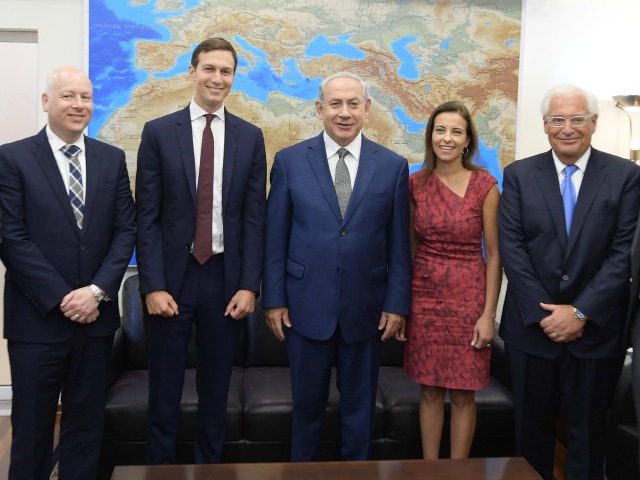TEL AVIV – The Trump administration has begun drafting a proposal based on the so-called two-state solution with the aim of reaching a final status Israeli-Palestinian agreement, the New York Times cited analysts and U.S. officials as saying on Saturday.
According to White House officials, the plan will attempt to address “perennial dividing points” such as the status of Jerusalem and West Bank settlements.
“We have spent a lot of time listening to and engaging with the Israelis, Palestinians and key regional leaders over the past few months to help reach an enduring peace deal,” the Times quoted Special Negotiator to the Middle East Jason Greenblatt as saying. “We are not going to put an artificial timeline on the development or presentation of any specific ideas and will also never impose a deal.”
“Our goal is to facilitate, not dictate, a lasting peace agreement to improve the lives of Israelis and Palestinians and security across the region,” he added.
Authors of the draft include Greenblatt, President Donald Trump’s son-in-law and senior adviser Jared Kushner, Deputy National Security Adviser for Strategy Dina Powell and U.S. Ambassador to Israel David Friedman.
The four will also consult with Donald Blome, the consul-general in Jerusalem, and others from the State Department and National Security Council. The plan could take until next year to be formulated, the report said.
The Times quoted some analysts as saying that the proposal would necessitate confidence-building measures from both sides. “For Israel, it could include limiting settlement construction to current blocs without taking new land, recommitting to a two-state solution and redesignating a small part of the West Bank to give Palestinians more control,” the report said.
“For the Palestinians, it could include resuming full security cooperation with Israel, holding off seeking further international recognition and ending payments to families of Palestinians imprisoned for terrorist attacks. Arab states, particularly Saudi Arabia, Egypt, the United Arab Emirates and Jordan, could add their own commitments, like overflights by Israeli passenger planes, visas for business people and telecommunications links.”
But the report went on to quote a White House official who dismissed such requirements as “mere speculation.”
Trump has never expressed outright endorsement of the two-state solution, instead saying he prefers the solution that “both parties like best.”
Late last month, a senior White House official reiterated this position, saying the president “is personally committed to achieving a peace deal between Israelis and Palestinians that would help usher in an era of greater regional peace and prosperity.”
Trump “reaffirms that peace between Israelis and Palestinians can only be negotiated directly between the two parties and that the United States will continue working closely with the parties to make progress toward that goal. No deal will be imposed on Israelis and Palestinians. We are committed to facilitating a deal that improves conditions for both parties,” the official added.
On Saturday, Palestinian Authority President Mahmoud Abbas addressed a crowd in Gaza saying that Palestinians may revert to endorsing a one-state solution for Arabs and Jews – a scenario that would mean the end of the Jewish state – if the now “endangered” two-state solution fails.
“The two-state solution is now in real danger,” Abbas said during a memorial for late PLO leader Yasser Arafat. “We will demand equal rights for the people of historic Palestine if a two-state solution is not implemented.

COMMENTS
Please let us know if you're having issues with commenting.